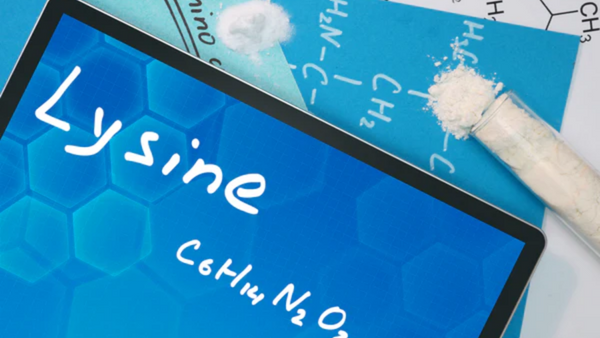Lysine is one of the essential amino acids that we must consume through food. It serves as a protein building block from which the body can produce protein. But lysine has other functions too. For example, it has an antiviral effect and is important for the immune system. More on this below.
IT'S WORTH READING!
AT THE END OF THE ARTICLE WE HAVE PROVIDED YOU A VOUCHER CODE.

Foods with lysine
Lysine is a component of protein and is therefore found in protein-rich foods. Meat, fish and eggs contain particularly high levels of lysine. But legumes such as soybeans are also a good source of lysine.
The following foods are good sources of lysine: [1]
|
Groceries |
Lysine content in mg/100 g |
|
Parmesan |
3844 |
|
Chicken breast |
3257 |
|
beef |
3053 |
|
Salmon |
2513 |
|
Soybeans |
2344 |
|
Peanuts |
Peanuts 926 [2] |
|
Eggs |
914 [3] |
Lysine requirement
The daily lysine requirement has not been well researched. Scientists estimate that it is about 30 mg per kg of body weight. For a body weight of 80 kg, that would be 2400 mg. However, other scientists estimate the requirement to be slightly higher or lower.

Functions of lysine in the body
Building block of collagen
Lysine is a proteinogenic amino acid and a building block for the body's own proteins. It is therefore also a component of the most common protein in the body: collagen . Collagen is a connective tissue protein and is found in skin, bones, tendons, ligaments and cartilage.
Synthesis of L-carnitine
L-carnitine is an amino acid that does not serve as a protein building block. L-carnitine is needed to transport fatty acids to the power plants of our cells, the mitochondria. With the help of L-carnitine, the body can convert fat into available energy.
L-carnitine is found in food, mainly in meat. The body can also produce L-carnitine itself, from lysine and methionine. [4] It also requires B vitamins (vitamin B3 and vitamin 6), vitamin C and iron as cofactors.
Antiviral effect
Lysine has an antiviral effect, which has been well researched, especially with regard to herpes viruses. [5] Lysine is also important for the immune system.
Calcium absorption in the intestine
Lysine appears to be important for the absorption of calcium in the intestine. It is also thought that lysine can reduce the excretion of calcium in the urine. [6] Thus, it is probably indirectly important for bone health.

Symptoms of lysine deficiency
Typical symptoms of lysine deficiency include:
- Increased susceptibility to infection
- Disturbances in wound healing
- Weight loss
- Tiredness and exhaustion
- Anemia
- Mild irritability
However, these symptoms are non-specific. This means that they do not clearly indicate a lysine deficiency and can have many other causes.
The supply of lysine can also be measured in the blood. The normal value for lysine in blood serum is between 82 and 239 µmol/l.
Cover lysine needs
Lysine requirements can usually be met through diet. However, malnutrition or a low-protein diet can result in lysine and other essential amino acids being deficient. Taking essential amino acids can help meet the need for essential amino acids such as lysine.
Conclusion: Lysine has many functions in the body
Lysine is an essential nutrient that should not be neglected. The amino acid serves as a protein building block, but also has other functions. If you have a low-protein diet, it can be difficult to meet your lysine requirements.
WE HAVE YOU 10 % VOUCHER FOR OUR
Amino-8
PROVIDED AND HOPE TO BRING YOU JOY WITH IT.
SIMPLY COPY THE FOLLOWING COUPON CODE
AND ENTER IT AT CHECKOUT:
AMINO+V10
To the product
[1] https://nutritiondata.self.com/foods-000083000000000000000-w.html
[2] https://nutritiondata.self.com/facts/legumes-and-legume-products/4355/2
[3] https://nutritiondata.self.com/facts/dairy-and-egg-products/111/2
[4] https://pubmed.ncbi.nlm.nih.gov/18477325/

















